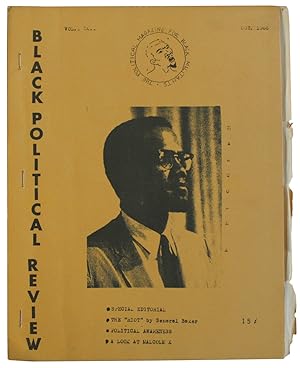Beschreibung
11" x 8½". Stapled wrappers. pp. 28 + laid in leaf. Very good: top staple loosening, wrappers lightly dust soiled, moderate edge wear; laid in sheet with numerous small tears at right edge. This is the first issue of a periodical which documents a short-lived political movement by a young man who later married the author, Gayl Jones. Over time, he went insane and made nationwide news in 1998 when an article about Jones' latest book led to a standoff with police and his suicide. The founder of the movement, Robert C. Higgins, was born in Cleveland in 1947, abandoned at a young age by his mother, and raised by relatives and foster families in Detroit. One foster family was that of George Breitman, a strong supporter of Black nationalism, who was also a strong influence on Higgins. At the age of 19 Higgins founded an organization on the Wayne State campus called the "Black Political Study Group" ("BPSG"). According to a 1998 New York Times article, during this time Higgins "routinely proclaimed his own brilliance, calling himself 'a true Hegelian,' and 'a math genius' who should be on the university's faculty. He was also writing a column for Wayne State's student paper ["The South End"] under the byline 'A. Violence.'" This first issue of BPSG's periodical, Black Political Review ("BPR"), has a long editorial which intermixes Higgins' thoughts on the purpose of BPR with current world events along with the roles played by African Americans within those events. It stated that: "the Vietnam issue is the number one foreign problem facing the American people, and the one which has caused their most concern next to the negro issue. Vietnam has kindled the fire in many young persons, who have called into question the true character of the U.S. . . . It has been recognized by many Afro-Americans that he is again called upon to fight for more democracy abroad than he has right here . . . That even if he were not fighting and dying out of proportion to his percentage of the population; that even if there was no discrimination in the armed forces, he still would have no business dying and killing in Vietnam, while there is still Mississippi, Harlem and Watts . . . It would seem, therefore, only reasonable to expect a similar conflict in our own national boundaries. In economic contradictions, in social unrest, and, possibly, in people's movements." The magazine has a two page article on the 1966 Detroit riot by General Gordon Baker, Jr., a Black labor organizer and founder of the Dodge Revolutionary Movement as well as an article on political awareness by Rufus Griffin. According to BPR, Griffin was charged with possession of concealed weapons in "the infamous riot in Detroit that never occurred." In 1967, Griffin, Baker and Glanton Dowdell founded the Detroit chapter of the Black Panther Party. Also included is a laid in sheet, "On Articles," that explained the type of content Higgins sought for BPR. He wrote that: "we are consciously seeking to have all radical political views presented, and to have opposing ideas brought into open battle field of these pages and contested. It is hoped that the stupid and futile ideas held by some will be clearly defeated and replaced by more logical and correct ones, and that the black militants reading the discussions will benefit from them." After his time at Wayne State, when Higgins was living in Staten Island and in the throes of rejection of a manuscript he hoped to have published, he: "went bananas and sparked a police standoff at his apartment. When the cops lobbed tear gas inside, Higgins took a suicidal leap out the window, landing on the frozen ground six floors below. Miraculously, he survived . . .and in 1975 showed up in Ann Arbor [where] he announced to old acquaintances that his survival was evidence of his 'godliness,' even proof that he was the new Messiah." Sometime in the late 1970s, Higgins and Gayl Jones became a couple. In the mid-1980s, according to the same New York Times articl. Bestandsnummer des Verkäufers 1344
Verkäufer kontaktieren
Diesen Artikel melden
![]()
